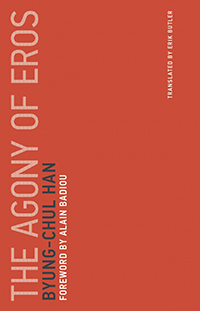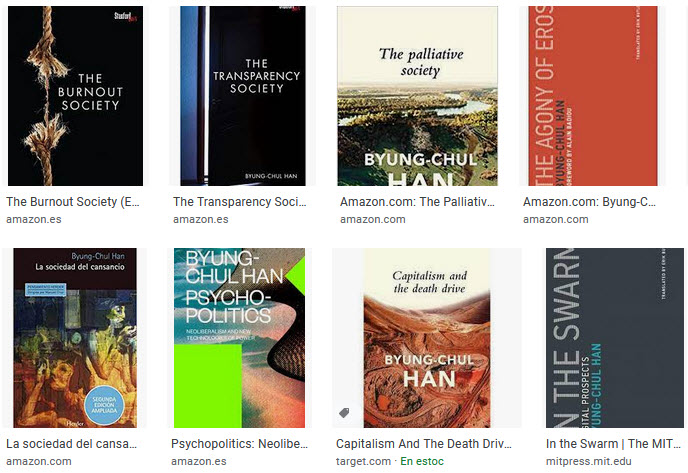
In “The Agony of Eros” Byung-Chul Han, writer and doctor of philosophy, born in Korean, professor of Philosophy and Cultural Studies at the University of the Arts in Berlin presents an essay diagnosing the disappearance of seduction in a society subjected to acceleration and instant.
He identifies the ills of this hypermodern era (depression, narcissism, guilt, anxiety disorder and the respective psychosocial repercussions of these pathologies) as the symptoms of a society that equalizes and levels everything that crosses it, to be able to turn it into a consumer good.
His books, extremely short, are praised as outstanding pieces of a radical thought, which denounces the miseries of neoliberalism by highlighting, under its apparent regime of freedoms, a system of self-exploitation of the individual.
The author reflects on how the mandate of today’s society “You can” is more coercive than the “You have” of discipline.
It has gone, “from the duty to do” something to “being able to do it.” “You live with the anguish of not always doing everything you can” “Now you exploit yourself and think you’re fullfillied.”
The subject, as an entrepreneur, is certainly free in so far as he is not subject to any other who commands and exploits him; but he is not really free, as he exploits himself, no matter how freely he does so. The exploitation to which one submits oneself is much worse than the external one, as it is aided by the feeling of freedom.
Psychopolitics is what Han defines as the new power techniques of neoliberalism, a system of domination that, instead of using oppressive power, uses a seductive, intelligent power that gets men to submit by themselves in the web of domination.
“Now, under the neoliberal regime of auto-exploitation, people are turning their aggression against themselves. This auto-aggressivity means that the exploited are not inclined to revolution so much as depression.
The author also argues that the exacerbation of current pornography has destroyed eroticism and desecrated Eros. As for this, he describes how its commodification and cyber expansion has annihilated sex as it has taken its content. In this sense, Han expresses that porn is the complete opposite of Eros since there is no sex in it.
“The obscene in porn is not the excess of sex, but there is no sex there”
The book is a sharp critique of the neoliberal capitalist system which is responsible for the gradual disappearance of Eros.
“The more equal people are, the more production increases; this is the current logic; capital needs us all to be equal, even tourists; neoliberalism would not work if people were different” capitalism subjects everything to consumption , in the exhibition as a commodity, so it intensifies pornography, as it knows no other use of sexuality.
The erotic experience thus disappears. The current crisis of art, and also of literature, can be attributed to this disappearance of the other, to the agony of Eros.
Political actions communicate with Eros, as they presuppose the common desire for another way of life. Love interrupts the perspective of one and makes the world emerge from the point of view of the other, of difference. Thus, Eros is a source of energy for political protest. It manifests itself as a revolutionary aspiration to a completely different society.
The Han’s lucid vision has already been raised in one way or another by many others, and to understand more about the relationship between power, sexual repression, and pornography, you can read the posts dedicated to “The Transformation of the intimacy” by Giddens and that of “The Mass Psychology of Fascism” by Reich.
More about Han and his complete bibliography:

A more detailed review of the book in this journal article “Psicología, Conocimiento y Sociedad” from the Republic University (Uruguay), and one interesting Han interview at “Babelia“, from the cultural section in the “El País” newspaper. (Both in spanish)
